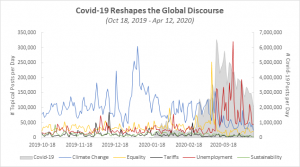“Abandon hope all ye who enter here” has become the unofficial maxim of most stock exchanges since March when the FTSE tumbled towards a low of 4,800 points and the Dow Jones saw the three worst point drops in its history.
Broader economic measures haven’t offered much optimism either – if I made a wordcloud of my news alerts over the past fortnight, it would mostly feature the word ‘contraction’ in a soup of negative adjectives.
It’s already a truism that we’re undergoing an unprecedented – and in part irrevocable – change to how societies and economies operate. While there may be some positive impacts in the long-term, from an investment perspective, there is one area in particular that is set to suffer.
ESG (environmental, social & governance) investing is one of the most likely victims of the financial shockwaves from COVID-19. Yet, immediately before the crisis took hold, this sector was flourishing, with a record 479 green bonds issued in 2019. It was only in January of this year that Blackrock’s Larry Fink – in characteristically straight-talking fashion – said that climate change had become a “defining factor in companies’ long-term prospects”. In fact, evidence for the approaching heyday of ESG was everywhere, from a January study showing that investors will pay more for stocks in companies that give to charity, to a 2020 ETF (exchange-traded funds) study showing that 74% of global investors planned to increase their ESG asset allocation over the next year. But given the current context, how many of these plans are likely to remain intact?
With a global downturn not only likely, but threatening to out-plummet the crash of 2008, how much goodwill is left for ESG? The natural reaction for many will be to refocus on short-term gains, to rebuild portfolios and make up the loss: a return to the stark profit motive. Unfortunately many ESG investments are long-term, carrying risk and uncertainty aplenty.
So is it really the case that a small mutation in a hitherto unheard of virus could derail the global environmental and social momentum we’ve been awaiting for decades? Well, yes, it looks that way. But is it a foregone conclusion? Perhaps not.
It depends, to some extent, on us marketers.
Driving a green recovery
The COVID-19 crisis has caused immeasurable suffering but, from an environmental perspective at least, it has not been without its glimmers of hope. From dramatic improvements in air and water quality to the emergence of seldom seen wildlife, we’ve seen a glimpse of a world less choked by pollution. We’ve also seen unprecedented changes to our own activity, having been forced to radically redefine our relationship with travel and consumption. These behaviour changes were once thought impossible, but have – for now at least – become the reality.
However, these positives have quite naturally been drowned out by the weight of bad news and, as the below graphic from reputation intelligence specialist Polecat shows, the extent to which climate change (in blue) has been pushed down the agenda by COVID-19 (in solid grey) should not be underestimated. And that’s where we communicators come in.

As Bill Gates noted in a recent Economist article, the lasting impact of COVID-19 on the world will not be defined by our response so far, but in how the world reacts over the months ahead.
Financial services marketers, from asset managers to global banks, now have a unique opportunity to put a stake in the ground, pinning their firms’ reputations to a progressive agenda that sees COVID-19 as a chance to reset the dial and drive a green recovery. Instead of setting progress back years, it’s possible to advocate for a response to the downturn that centres on recognising the transformative lessons of the crisis and locking-in the best of those learnings when we rebuild our economies.
Without influence, it’s all too likely that old habits will resurface and the stark profit motive will take precedence, at least until the aftermath has started to clear, by which time the opportunity for lasting change will be lost.
The stage is now set for pioneering financial institutions and investment houses to lead substantial thought leadership campaigns that put their weight behind a far more positive response, connecting capital to positive change that could redirect us to a green recovery. If that happens – if we, as financial services marketers, succeed in making it happen – our actions will echo around the world.
If you’d like to talk about what such a campaign could look like, and how it could move the needle for your reputation, drop me a note at [email protected] or email [email protected].
Head Office
Moore House
13 Black Lion Street
Brighton
United Kingdom
BN1 1ND
London Office
24/25 The Shard
32 London Bridge Street
London
United Kingdom
SE1 9SG
+44 (0) 1273 716 820
[email protected]
Head Office
Moore House
13 Black Lion Street
Brighton
United Kingdom
BN1 1ND
London Office
24/25 The Shard
32 London Bridge Street
London
United Kingdom
SE1 9SG
© 2005 - 2024 Man Bites Dog